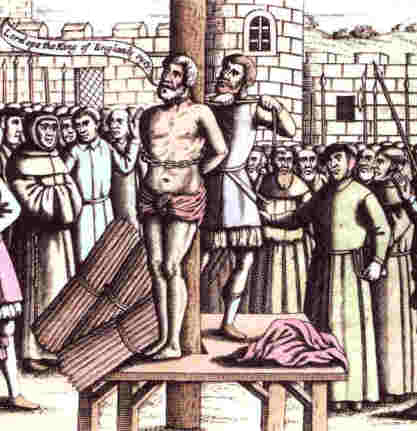In a previous series on preaching, we have seen one way that Christianity has become a religion of words.
Christianity should, however, be a life of loving action and service of others. As followers of Jesus, we are to live like Jesus and love others like Jesus, but far too often, Christianity degenerates into arguing about words related to Jesus, rather than living like Jesus.
Saddest of all is when as a result of our war of words, Christians not only fail to love others, but actually go and kill others instead. Even as early as the 4th century AD, continuing all the way through the Middle Ages and the Reformation up until even modern days, it is not uncommon to hear about one group of Christians seeking to slander, destroy, imprison, and even kill other Christians with whom they disagree theologically.

Murder in Church
Though for the first 350 years of church history, Christians were persecuted by others, after Christianity became the official religion of the Roman Empire and gained all the power inherent within that position, the persecuted quickly became the persecutors, hunting down and killing not only those who refused to convert to Christianity, but also those Christians who held to different theological beliefs than those of the church leaders in power.
For example, one of the major theological debates in the Fourth and Fifth century AD concerned the nature of Jesus Christ. Was He fully God? Was He fully man? If He was God and man, did He have one nature, or two? Was He one person, or two? And in regard to both, how did His divinity and humanity interact? Though the theological scuffle waged for many years, the church eventually decided in 451 AD that Jesus had two natures in one person.
Many Christians did not agree with this decision, and in 457 “Jerusalem was occupied by an army of monks [where] in the name of the one incarnate nature, they pillaged, they burnt, they murdered; the Sepulchre of Christ was defiled with blood.” Then on the third day before Easter, the mob entered the baptistery of a city church and butchered the Bishop Dioscorus, along with six other clergy members, then paraded the bleeding corpses around the city, before burning the remains and scattering the ashes to the wind.
Later, some members of Eastern Orthodoxy cut out the tongue and amputated the right hand of a teacher named Maximus for teaching that Christ participated in fully human activity and had a fully human will. They believed that without a tongue to speak or a hand to write, he would no longer be able to teach what they had condemned as “heresy.” Then, during the Crusades, there is the widespread slaughter of the Albegensians, who held to a dualistic rejection of all things material in order to achieve spiritual purity, and John Calvin who burned Servetus at the stake for denying the Trinity, and Zwingli who had several Anabaptists drowned for their belief in getting rebaptized as adults.

We Still Fail at Loving One Another
Though such theological murders are not as common today, they still do take place in various parts of the world, though generally, the issues are not as much over theological issues, but economic and social issues. Theology is just used an excuse. However, in all “Christian” societies, while we may not murder others in the name of Jesus because others disagree with us theologically, we frequently make attempts to slander, abuse, and even destroy the jobs or incomes of other people if they disagree with us.
When some people find others who disagree with them theologically, they may refuse to do business with them, will shun them in public places, and often speak negatively about them to others. Occasionally, nasty letters (or even books) of condemnation will be written. Worse yet, some people seek to get others fired from their jobs. It is not uncommon for pastors, professors, and other church leaders to call for the termination of other pastors, professors, and church leaders over a book that was published, a sermon that was preached, or a lecture that was taught, in which some questionable theological statements were made.
I have had personal experience which such treatment, and will share some of my story tomorrow.
What about you? Have you ever encountered hateful and hurtful treatment at the hands of other Christians because of something you believed and they didn’t?




Hmmm…interesting you should ask. I grew up in a denomination that taught they were superior to other denomination because of their understanding of ‘certain Biblical truths’ that others ‘rejected’. And said denomination was looked down on by others because of the same. Sigh. It could get ugly – to the point of being accused of demon possession.
I walked away from church at 16 in disgust at the behavior of the pastor and lay leaders. Didn’t become involved with a church again until 20 years later. Same bs. When, as a leader, I walked away because of the behavior of the pastor, I was shunned, vilified…and just last week (4 1/2 years after I left) I was treated with condescension and pity by someone that used to be a good friend.
As I enter into a new place in life, I know that what I have learned in the last few years about God and life will not sit well with a lot of the church world. I just walked away from a discussion at another site be cause I was told I was being rebellious to God for disagreeing with this person’s interpretation of the Bible.
Katherine,
I truly think that most of this “you disagree with me so you are disagreeing with God” mentality is actually breaking the commandment to not take the name of the Lord in vain. I think that commandment means to not attach the name of God to something that it should not be attached to. When people invoke God’s name for selfish reasons, it is breaking this commandment.
I was condemned as a heretic in December 2001 by my Baptist Church here in WV. My crime? I admitted to my late pastor before he died that I didn’t feel the KJV was inerrant. I was ejected, condemned and “given over to Satan” to do with me as it pleased, him.
True story folks.
Mike,
That is a story I often hear. It is very sad. What have you done to “recover” from such treatment?
Jeremy:
I have not really recovered in the strictest sense of the word. Almost no local assembly will invite me to speak, once an assembly finds out whop I am, an offer to attend regularly is never extended. I have plenty of brothers and sisters that exist via the internet but not so in person. I am afraid it is too much to bear for most here in WV. It gets lonely sometimes.
Peace,
G’day Mike
I don’t live in the US, but what you describe seems to be more a US phenomenon than elsewhere. I too am sad to hear your story. If it’s any consolation, I believe there is a growing flood of people rejecting that form of christianity, not out of rebellion but out of obedience to the Holy Spirit. I do hope you find some other like-minded christians you can meet with face-to-face, but until then, isn’t the internet a blessing!?
Mike,
That does sound very lonely. It sounds like you might be fairly entrenched there in WV, but there are other places in the US and around the world where you would be welcomed with open arms. Then there is also the church planting option….
Mike,
That does sound lonely, are your options really that exhausted? I know WV has a fairly large Baptist demographic (about what, 1/3 of the population), but not all Baptists are KJV Onlyists and there are probably at least as many other Protestant churches, or have you found the other local churches to all be equally unwelcoming to you for other things you do/don’t believe?
I think the latest controversy between Norman Geisler and Mike Licona is another example. Geisler equates biblical inerrancy with his own interpretations of Scripture, and so when Licona offers an interpretation of Matt. 27 that suggests the use of apocalyptic special effects language instead of straightforward history, he is publicly called on by Geisler to recant and apologize for straying from inerrancy. Geisler has since attempted to rally the troops against Licona to coerce him into submission. Of course, this all coming from someone (Geisler) speaking outside his area of expertise.
Scott,
You are absolutely right. We must not confuse our understanding of Scripture with inerrancy. This happens far too often when people accuse others of believing the Bible has errors. Genesis 1-2 is a big battleground for this as well. In this series on doctrinal statements, I will argue that something similar happens in many other areas of theology as well.
Inerrancy is part of a group of doctrines that support a “high” view of scripture – God’s revelation has authority over human logic and traditions.
So, where does the Bible teach inerrancy? Is it a human doctrine rather than a Biblical one?
I wrote a whole series on inerrancy a while back. Here are some of the posts:
https://redeeminggod.com/arguments-against-inerrancy/
https://redeeminggod.com/bible-contains-errors/
https://redeeminggod.com/bible-a-fable/
https://redeeminggod.com/problem-with-the-bible/
https://redeeminggod.com/how-is-the-bible-true/
Yes, I recall reading it, and agreeing with most of what you said.
Anyone familiar with church history is well aware of the many excesses of the “Christian” religion including persecuting, even to the point of death, those who dare disagree with the opinions of those currently in power. Sounds like political disagreements, doesn’t it?
There is scant evidence that Jesus died on a cross to found a new religion, yet that is what those who stand to profit (power, authority, position and money) from such an idea would have us believe.
I’m currently reading Yancey’s “The Jesus I Never Knew”. The title intrigued me. To me, it describes so much that has prospered under the banner of “Christianity”.
Perhaps those who insist on “doctrinal purity” (to their doctrine/Biblical interpretation/opinions) are the real heretics.
“There is scant evidence that Jesus died on a cross to found a new religion”
I think this is a matter of definition. If we define “religion” as rules and behaviours people set up instead of following Jesus, then I’m sure you are right. But he certainly died to establish God’s kingdom, which was something new. We so often, unfortunately, choose religion rather than kingdom.
Yes, I agree. I am defining religion more along the lines of your first definition, especially as applied to “Christian” religion. As Steve Brown says, “I’m sick of religion.”
Jesus did come to establish the Kingdom of God. I try to follow Jesus, but am certainly not a fan of the “Christian” religion.
Sam and UnkleE,
Great points, and I agree with both of you. Jesus brought in the Kingdom, not a new religion.
Of course, I still struggle some with James 1:27 where James, the brother of Jesus, and one of the leaders of the Jerusalem church talks about pure religion that God accepts and finds faultless. Of course, no doctrinal statements are mentioned there, no rituals, no structures, but only caring for orphans and widows.
That doesn’t fit the definition of “religion” but it is the “religion” that God is a part of, if we can call it that…
“I still struggle some with James 1:27 where James, the brother of Jesus, and one of the leaders of the Jerusalem church talks about pure religion that God accepts and finds faultless. “
Yes, that is why I said it depends on our definition,